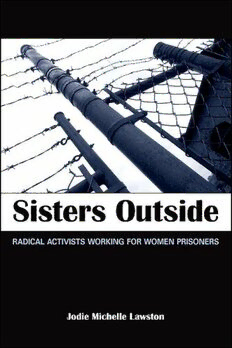
Sisters Outside: Radical Activists Working for Women Prisoners PDF
171 Pages·2009·4.038 MB·English
Most books are stored in the elastic cloud where traffic is expensive. For this reason, we have a limit on daily download.
Preview Sisters Outside: Radical Activists Working for Women Prisoners
Description:
How can radical women activists for women prisoners be a “voice and a presence” for people so different from themselves? The radical activists who envision a postprison society are predominantly white, middle class, and well educated; the prisoners they advocate for are predominantly disenfranchised women of color. While the activists lead lives of relative comfort, conditions in women’s prisons may include sexual and emotional abuse and medical neglect. Jodie Michelle Lawston examines the dilemmas that arise as activists attempt to challenge injustices and oppression in these prisons. Activists question their place in leading organizations speaking for incarcerated women of color, and they question whether they will be accepted by these women as legitimate representatives. Knowing that their radical goals are generally not well received by the mainstream public, activists realize they must cast their efforts as a credible social movement when dealing with that public. Lawston maps the discourses that activists from a radical group in California generate in order to overcome these tensions and provides comments from the activists themselves.
See more
The list of books you might like
Most books are stored in the elastic cloud where traffic is expensive. For this reason, we have a limit on daily download.
